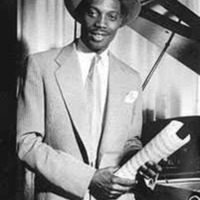Aldwyn Roberts (Lord Kitchener)
Dublin Core
Title
Aldwyn Roberts (Lord Kitchener)
Subject
arrival
Description
Lord Kitchener, (Aldwyn Roberts), Trinidadian singer and songwriter (born April 18, 1922, Arima, Trinidad, British West Indies — died Feb. 11, 2000, Port of Spain, Trinidad and Tobago), was called the “grandmaster of calypso” and was instrumental in popularizing that music internationally. He was especially admired for his melodious style and his witty, often bawdy, lyrics.
In 1947, Kitch was proclaimed the best calypsonian of the year. His big tunes for that year were "Scandal in St. Ann's," "Mount Olga," and "Tie Tongue Mopsy." Soon after the success of 1947, Kitch left T&T; for Aruba, then on to Jamaica, where he lived for six months, teaching calypso and playing to packed audiences. After Jamaica, the next stop was London. Kitch arrived on a boat, the M.V. Windrush, at the port city of Tilbury on June 21, 1948. One of the other passengers on that M.V. Windrush was Egbert Moore (Lord Beginner). Kitch got an immediate booking at the only West Indian club in London, following his debut on the BBC. Six months later, Kitch was appearing in three clubs nightly, and his popularity extended beyond the West Indian and African night club audiences, to include music hall and variety show audiences.
The days in London were very good days for Kitch. He had everything he wanted. Lots of money, fan mail from all over the world, clothes, fancy hats and shoes, and lots of lady friends. But the night life was getting the better of Kitch. Therefore, he decided to slow down, leave London, and move to Manchester in the north of England. There, he met, and in 1953, married his English wife, Marjorie.
Kitch also started writing calypsoes again in 1953, and in that year he wrote "Africa My Home," "Beware Tokyo," and "If You Not White, You Considered Black." Soon, Kitch opened his own club in Manchester, and also received a six month contract to tour the U.S. where he appeared in New York, Washington D.C., and other cities on the East Coast.
Kitch later returned to England, and in 1958 he made his first of several recordings for the Melodisc record label. The days in Manchester were even more successful for Kitch than his days in London. He became the proprietor of a two-apartment buildings, expanded his club, and formed a dance band.
During the 17 years Kitch was away from T&T;, he sent back great calypso tunes which became very popular. Tunes like "Mama Look The Band Passing," "Nora, Nora, Nora," "Trouble In Arima," belong to this period.
After living in London from 1948 to 1962, Lord Kitchener returned to newly independent Trinidad and Tobago, where he won the coveted title Road March King at Port of Spain’s carnival 10 times before he ceased to compete in 1976. In the 1990s his image appeared on a stamp, and a statue was erected in his honour in Port of Spain.
Source
stories,arrival
Type
Story
Identifier
6224
Spatial Coverage
current,51.498484547170605,-0.12084960937500001;origin,10.632265280829252,-61.28173828125001;
Europeana
Europeana Type
TEXT
Citation
“Aldwyn Roberts (Lord Kitchener),” EU-LAC, accessed February 19, 2026, https://eu-lac.org/omeka/items/show/6718.
Embed
Copy the code below into your web page
